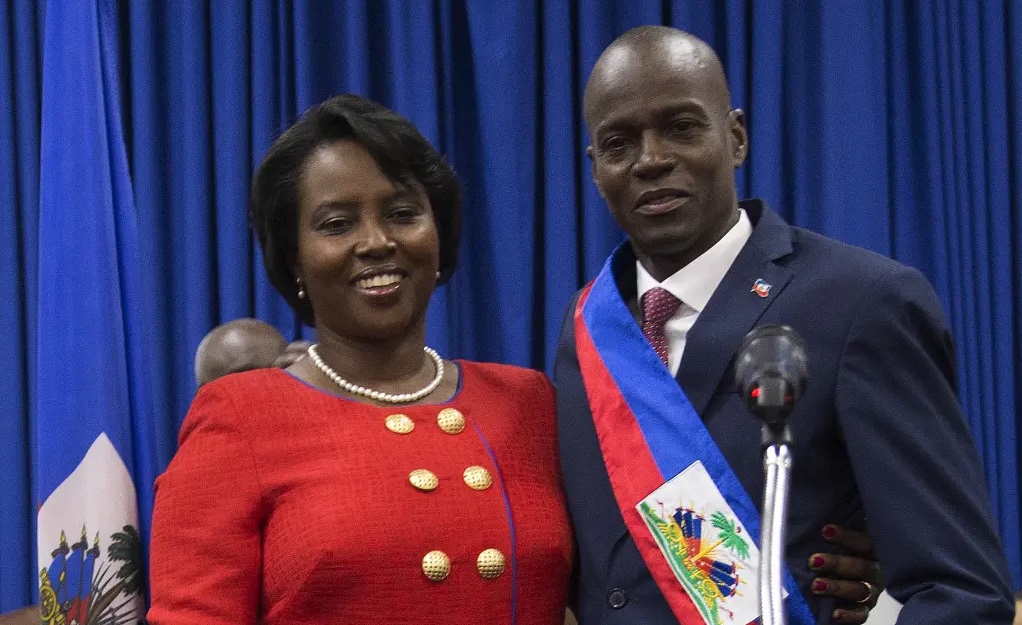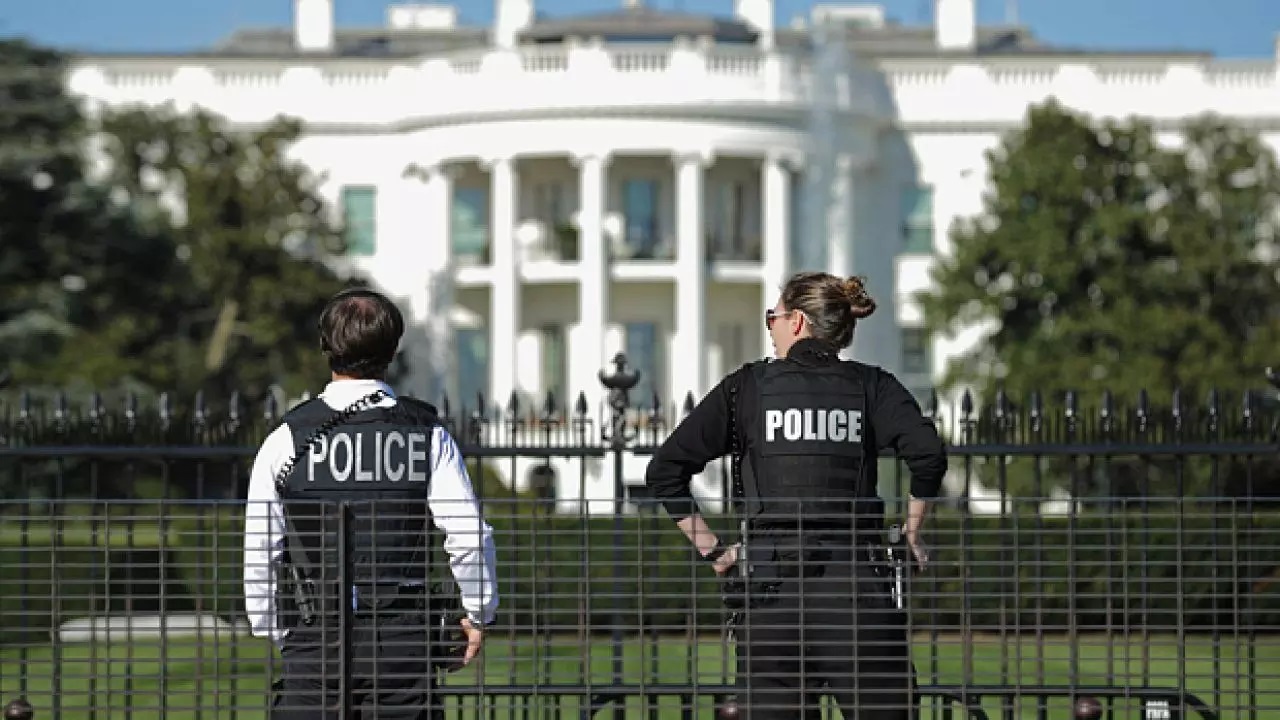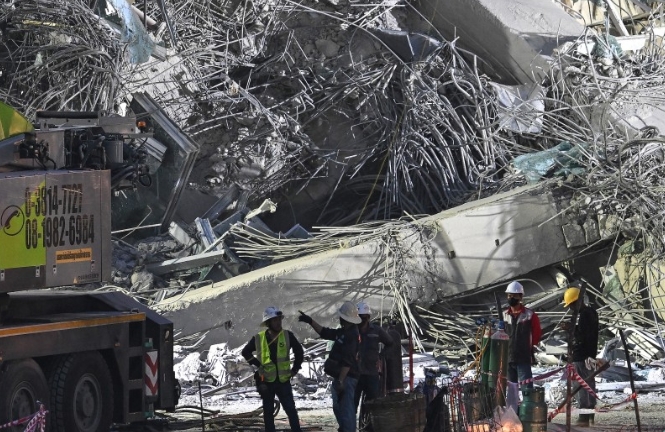Foreign
Wife of Haiti’s assassinated president indicted in his killing

A judge in Haiti investigating the July 2021 assassination of President Jovenel Moïse indicted his widow, Martine Moïse, ex-prime minister Claude Joseph and the former chief of Haiti’s National Police, Léon Charles, among others in his killing.
Dozens of suspects were indicted in the 122-page report issued by Walther Wesser Voltaire, who is the fifth judge to lead the investigation after previous ones stepped down for various reasons, including fear of being killed.
Charles, who was police chief when Moïse was killed and now serves as Haiti’s permanent representative to the Organization of the American States, faces the most serious charges: murder; attempted murder; possession and illegal carrying of weapons; conspiracy against the internal security of the state; and criminal association.
Meanwhile, Joseph and Martine Moïse, who was injured in the attack, are accused of complicity and criminal association.
Joseph, the former prime minister, shared a statement with The Associated Press accusing Henry of “undermining” the investigation and benefitting from the president’s death.
“Henry … is weaponizing the Haitian justice system, prosecuting political opponents like me. It’s a classic coup d’état,” Joseph said. “They failed to kill me and Martine Moïse on July 7th 2021, now they are using the Haitian justice system to advance their Machiavellian agenda.”
Joseph again called on Henry to resign and noted that while he was still prime minister, he invited the FBI to help local authorities investigate the killing and wrote the U.N. and OAS for help.
“I won’t stop my fight. Justice must be served,” he said.
In his report, the judge noted that the former secretary general of the National Palace, Lyonel Valbrun, told authorities that he received “strong pressure” from Martine Moïse to put the president’s office at the disposal of Joseph because he needed it to “organize a council of ministers.”
Valbrun also said that two days before her husband was killed, Martine Moïse visited the National Palace and spent nearly five hours, from 10 p.m. to 3 a.m., removing “a bunch of things.”
He said that two days after Jovenel Moïse was slain, Martine Moïse called to tell him that, “Jovenel didn’t do anything for us. You have to open the office. The president told Ti Klod to create a council of ministers; he will hold elections in three months so I can become president, now we will have power.”
While the document did not identify Ti Klod, the former prime minister, Claude Joseph, is known by that name.
The judge also stated in his report that Martine Moïse “suggested” she took refuge under the marital bed to protect herself from the attackers, but he noted that authorities at the scene found that not “even a giant rat…whose size measures between 35 and 45 centimeters” could fit under the bed.
The judge said the former first lady’s statements were “so tainted with contradictions that they leave something to be desired and discredit her.”
Others who face charges including murder are Christian Emmanuel Sanon, a Haitian-American pastor who visualized himself as Haiti’s next president and said he thought Moïse was only going to be arrested; Joseph Vincent, a Haitian-American and former informant for the U.S. Drug Enforcement Administration; Dimitri Hérard, presidential security chief; John Joël Joseph, a former Haitian senator; and Windelle Coq, a Haitian judge whom authorities say is a fugitive.
Sanon, Vincent, and Joseph were extradited to the U.S., where a total of 11 suspects face federal charges in the slaying of Haiti’s president. At least three of them already have been sentenced.
Meanwhile, more than 40 suspects are languishing in prison in Haiti awaiting trial, although it was not immediately clear how quickly one would be held following Monday’s indictments. Among them are 20 former Colombian soldiers.
Milena Carmona, wife of Jheyner Alberto Carmona Flórez, told The Associated Press that he is innocent.
“What’s happening is that this crime is a conspiracy of great magnitudes in which powerful people are behind the scenes running everything, and that’s why they’re not given freedom,” she said of the former soldiers.
U.S. prosecutors have described it as a plot hatched in both Haiti and Florida to hire mercenaries to kidnap or kill Moïse, who was 53 when he was slain at his private home near the Haitian capital of Port-au-Prince.
The attack began late July 6 and ended July 7, according to witnesses.
Martine Moïse and others who were interrogated said they heard heavy gunfire starting around 1 a.m. that lasted between 30 to to 45 minutes before armed men burst into the bedroom of the presidential couple.
Moïse said she was lying on the ground when she heard the attackers yell, “That’s not it! That’s not it! That’s not it!”
She said the suspects made a video call to identify the exact location of what they were searching as they killed the president. She added that she was face down when the suspects tilted her head and tugged on one of her toes “to ensure that she wasn’t alive.”
Once they left, Moïse said she dragged herself on the ground and whispered to her husband that she was going to try and go to the hospital.
“That’s when she noticed that the president was dead and that his left eye had been removed from the socket,” the report stated.
Moïse said a group of about 30 to 50 police officers were supposed to guard the presidential residence, but the judge noted that only a handful of officers were present that night.
One officer told the judge that he heard explosions and a voice through a megaphone saying, “Do not shoot! It’s a DEA operation! US Army! We know how many officers are inside. Exit with two hands lowered.”
Another officer said the head of security of the first lady found her “in critical condition” surrounded by her two children. He said he also saw an undetermined number of people coming out of the president’s residence “with briefcases and several envelopes in their possession.”
The report quotes Inspector General André Vladimir Paraison saying that the president called him at 1:46 a.m. and told him, “Paraison! Man, hurry up! I’m in trouble! Come quickly and save my life.” He said he encountered heavily armed men and couldn’t access the residence immediately.
Officers at the scene said they found cars, windows, and doors at the president’s private home riddled with bullet holes, along with surveillance cameras cut off and a broken lock on the double-wooden door leading to the presidential bedroom.
The judge said some police officers at the residence were disarmed and handcuffed, while others “had time to throw themselves down a ravine” for safety. In addition, the police officer overseeing presidential security was accused of receiving $80,000 to bribe certain officers “to remain inactive” during the assassination, according to the report.
The judge noted how “none of the police providing security to the head of state was in danger. Unfortunately, the head of state was assassinated with ease.”
Foreign
U.S. prohibits personnel in China from romantic, sexual relationships with Chinese citizens

The U.S. government has banned American government personnel in China, as well as family members and contractors with security clearances, from any romantic or sexual relationships with Chinese citizens, The Associated Press has learned.
Four people with direct knowledge of the matter told the AP about the policy, which was put into effect by departing U.S. Ambassador Nicholas Burns in January shortly before he left China. The people would speak only on condition of anonymity to discuss details of a confidential new directive.
Though some U.S. agencies already had strict rules on such relationships, a blanket “non-fraternization” policy, as it is known, has been unheard of publicly since the Cold War. It’s not uncommon for American diplomats in other countries to date locals and even marry them.
A more limited version of the policy was enacted last summer prohibiting U.S. personnel from “romantic and sexual relations” with Chinese citizens working as guards and other support staff at the U.S. Embassy and five consulates in China. But Burns, the departing ambassador, broadened it to a blanket ban on such relations with any Chinese citizen in China in January, days before President Donald Trump took office. The AP was unable to determine exactly how the policy defined the phrase “romantic or sexual relationship.”
Two of the people with knowledge of the ban told the AP the new policy was first discussed last summer after members of Congress contacted Burns to express concern that restrictions on such relationships were not stringent enough. The House Select Committee on the Chinese Communist Party did not respond to a request for comment.
The new policy covers U.S. missions in mainland China, including the embassy in Beijing and consulates in Guangzhou, Shanghai, Shenyang and Wuhan, as well as the American consulate in the semi-autonomous territory of Hong Kong. It does not apply to U.S. personnel stationed outside China.
The only exception to the policy is U.S. personnel with pre-existing relations with Chinese citizens; they can apply for exemptions. If the exemption is denied, they must end the relationship or leave their position, the people said. Anyone who violates the policy will be ordered to leave China immediately.
The policy was communicated verbally and electronically to American personnel in China in January, but has not been publicly announced.
The State Department said it does not comment on internal matters. The National Security Council referred questions to the State Department. Burns, the former ambassador, did not reply to an AP request sent to his email address at The Cohen Group, a consultancy that he rejoined as vice chair in February.
Intelligence services across the world have long used attractive men and women to obtain sensitive information, famously during the Cold War. The State Department and other agencies with offices in China have long had stringent reporting requirements on personal relationships for American personnel stationed there, as well as rivals considered high intelligence threats such as Russia or Cuba.
Declassified State Department documents show that in 1987, the U.S. government barred personnel stationed in the Soviet bloc and China from befriending, dating or having sex with locals after a U.S. Marine in Moscow was seduced by a Soviet spy. Such restrictions were relaxed after the collapse of the Soviet Union in 1991, according to news reports at the time.
In China, a blanket ban on such relations has not been in effect for many years. Until the new ban in January, U.S. personnel in China were required to report any intimate contact with Chinese citizens to their supervisors, but were not explicitly forbidden from sexual or romantic relationships.
U.S. diplomats and intelligence experts say that Beijing continues to aggressively use so-called honeypots to access American secrets. In presentations before being stationed in China, U.S. personnel are briefed on case studies where Chinese intelligence services sent attractive women to seduce American diplomats, and warned that dozens of Chinese state security agents can be assigned to monitor any individual diplomat of interest.
Little is known about the U.S. government’s non-fraternization policies elsewhere, as they are considered classified. It is unknown how restrictive such policies are in other countries.
In recent years, tensions between Washington and Beijing have escalated over trade, technology and geopolitical competition.
Peter Mattis, a former CIA analyst and president of The Jamestown Foundation, a Washington-based think tank, said there were at least two publicized cases in which Chinese agents seduced American diplomats stationed in China, though he hasn’t heard of such a case in recent years.
Mattis added that another issue is that Chinese state security doesn’t gather intelligence just through spies, but also by pressing ordinary Chinese people for information, often through threats or intimidation. That, Mattis said, means any Chinese citizen who dates an American diplomat could be vulnerable to coercion.
“The MSS is willing to leverage any human connection that a target has to collect intelligence,” Mattis said, using an acronym referring to China’s Ministry of State Security. “This rule change suggests the MSS has gotten a lot more aggressive at trying to access the embassy and U.S. government.”
The Chinese foreign ministry did not comment on the ban, saying in a faxed statement that it was “more appropriate to ask the U.S. about this question.”
China also has been tightening already strict controls on its personnel overseas, according to Chinese regulations, news reports and four people familiar with China’s bureaucracy who spoke on condition of anonymity so they could discuss a sensitive topic. In recent years, Beijing began strictly enforcing regulations that bar promotions for Chinese civil servants with spouses who acquired foreign citizenship and restrict diplomats from spending an extended period of time in one country, forcing some to return to China.
China’s foreign ministry and many other government bodies bar their officials and staff from sexual or romantic relations with foreign citizens, while members of the Chinese military or police are generally barred from leaving China altogether without express approval from their supervisors.
Foreign
Suspicious package found near White House day after Trump imposed tariffs

Law enforcement is currently responding to reports of a suspicious package near the White House.
The area has been secured, and specialized units are on-site to assess the situation.
Authorities are urging the public to avoid the vicinity until further notice.
The section between 15th and 17th streets is completely shut down.
The bomb squad is now examining a suspicious package discovered in a dumpster nearby.
The package was found about 500 meters from the White House. President Donald Trump is currently in residence.
This is coming a day after Trump imposed tariffs on several countries, including US allies.
Foreign
Myanmar Quake Victim Rescued After 5 Days

Rescuers on Wednesday pulled a man alive from the rubble five days after Myanmar’s devastating earthquake, as calls grew for the junta to allow more aid in and halt attacks on rebels.
The shallow 7.7-magnitude earthquake on Friday flattened buildings across Myanmar, killing more than 2,700 people and making thousands more homeless.
Several leading armed groups fighting the government have suspended hostilities during the quake recovery, but junta chief Min Aung Hlaing said military operations would continue — despite international criticism of multiple reported air strikes.
UN agencies, rights groups and foreign governments have urged all sides in Myanmar’s civil war to stop fighting and focus on helping those affected by the quake, the biggest to hit the country in decades.
Hopes of finding more survivors are fading, but there was a moment of joy on Wednesday as a man was pulled alive from the ruins of a hotel in the capital Naypyidaw.
The 26-year-old hotel worker was extracted by a joint Myanmar-Turkish team shortly after midnight, the fire service and junta said.
Dazed and dusty but conscious, the man was pulled through a hole in the rubble and put on a stretcher, video posted on Facebook by the Myanmar Fire Services Department showed.
Call for peace
Min Aung Hlaing said Tuesday that the death toll had risen to 2,719, with more than 4,500 injured and 441 still missing.
But with patchy communication and infrastructure delaying efforts to gather information and deliver aid, the full scale of the disaster has yet to become clear, and the toll is likely to rise.
The World Health Organization (WHO) reported severe damage in the city of Sagaing, citing local rescuers saying one in three houses there have collapsed.
Healthcare facilities, damaged by the quake and with limited capacity, are “overwhelmed by a large number of patients”, while supplies of food, water and medicine are running low, WHO said in an update.
Sagaing has seen some of the heaviest fighting in Myanmar’s civil war, and AFP journalists have not been able to reach the area.
Relief groups say the overall quake response has been hindered by continued fighting between the junta and the complex patchwork of armed groups opposed to its rule, which began in a 2021 coup.
Julie Bishop, the UN special envoy on Myanmar, called on all sides to “focus their efforts on the protection of civilians, including aid workers, and the delivery of life-saving assistance”.
Even before Friday’s earthquake, 3.5 million people were displaced by the fighting, many of them at risk of hunger, according to the United Nations.
Late Tuesday, an alliance of three of Myanmar’s most powerful ethnic minority armed groups announced a one-month pause in hostilities to support humanitarian efforts in response to the quake.
The announcement by the Three Brotherhood Alliance followed a separate partial ceasefire called by the People’s Defence Force — civilian groups that took up arms after the coup to fight junta rule.
But there have been multiple reports of junta air strikes against rebel groups since the quake.
“We are aware that some ethnic armed groups are currently not engaged in combat, but are organising and training to carry out attacks,” said Min Aung Hlaing, mentioning sabotage against the electricity supply.
“Since such activities constitute attacks, the Tatmadaw (armed forces) will continue to carry out necessary defensive activities,” he said in a statement late Tuesday.
But the UN special rapporteur on human rights in Myanmar, Tom Andrews, rejected the junta’s characterisation of its operations.
“Senior General Min Aung Hlaing has described ongoing junta attacks in the midst of Myanmar’s suffering as ‘necessary protective measures’,” he wrote on X.
“They are neither necessary nor protective. They are outrageous and should be condemned in the strongest possible terms by world leaders.”
Rescue teams work to save residents trapped under the rubble of the destroyed Sky Villa Condominium development in Mandalay on March 29, 2025, a day after an earthquake struck central Myanmar. More than 90 people could be trapped inside the crushed remains of an apartment block in Mandalay in central Myanmar destroyed by a devastating earthquake, a Red Cross official told AFP on March 29 as rescuers worked to free the victims. (Photo by Sai Aung MAIN / AFP)
Thailand toll rises
Australia’s government decried the reported air strikes saying they “exacerbated the suffering of the people”.
“We condemn these acts and call on the military regime to immediately cease military operations and allow full humanitarian access to affected areas,” Foreign Minister Penny Wong said.
Amnesty International said “inhumane” military attacks were significantly complicating earthquake relief efforts in Myanmar.
“You cannot ask for aid with one hand and bomb with the other,” said the group’s Myanmar researcher Joe Freeman.
Hundreds of kilometres away, in the Thai capital Bangkok, workers continued to scour through the rubble of a collapsed 30-storey skyscraper.
The structure had been under construction when the earthquake hit and its crash buried dozens of builders — few of whom have come out alive.
The death toll at the site has risen to 22, with more than 70 still believed trapped in the rubble.
AFP
-

 News22 hours ago
News22 hours agoNatasha: Kogi PDP hammers Ododo, reiterates unfeigned support for her
-

 Economy21 hours ago
Economy21 hours agoSEE Black Market Dollar To Naira Exchange Rate Today 3rd April 2025
-

 News17 hours ago
News17 hours agoJust in: “Ignore rumour mongers, there was no time I collapsed “-Wike asserts
-

 News17 hours ago
News17 hours agoCJ transfers Natasha’s case to Justice Nyako
-

 News20 hours ago
News20 hours agoJust in: INEC dumps recall petition against Sen Natasha
-

 News6 hours ago
News6 hours agoHow I Got Helicopter Idea To Visit Kogi State – Senator Natasha
-

 Entertainment7 hours ago
Entertainment7 hours agoWhy I didn’t sleep with Bobrisky – Portable
-

 News6 hours ago
News6 hours agoRivers CJ directs High Court judges to proceed on break





